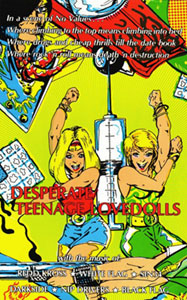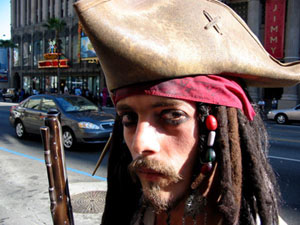Just Getting It Out There: An Interview with Filmmaker David Markey
Published on March 30th, 2008 in: Interviews, Issues, Movies, Underground/Cult |Popshifter: Do you think The Reinactors will bring about a revival of your old work?
Dave Markey: I think a lot of people will be looking for Desperate Teenage Lovedolls, etc. I think that’s great because those films really haven’t been seen by people for a very long time. Which is fine; I know the appeal of those films is what it was but it’s fantastic now that some kid can get the DVD and listen to the commentary and absorb the culture of it. I try to present the product in the way it was meant to be seen and keep the spirit of those times active in the information stored on those DVDs.

VHS cover of
Desperate Teenage Lovedolls
Image from
We Got Power Films website
I did a lot of work on the DVDs and I’m really happy with the way they turned out. I did a lot of work on them myself, spent a lot of time on them. They took me a while because I was doing it bit by bit and try to making it work financially, which is the thing that makes me work more slowly than other people. But it’s okay; I’ve learned patience over time and I’m glad I’m here now.
I work with a few people here and there. Especially, when I’m at a festival like this I’ve got people maintaining the website and running things. I have a guy named Jon Krop, who is a great graphic designer out of San Francisco, he’s worked with me on my site from day one. He oversees it. He was just a fan who contacted me and he needed some résumé pieces.
It’s pretty amazing how certain elements from the old days are still in place, it’s just shifted. I’m very low budget but the quality of my work has improved thanks to technology. Back in the 80s, you had Super 8 film that was used because it was cheap, but now everyone can be a filmmaker. And obviously that’s not going to work out for everyone.
On the other hand, it’s great, because if you’re resonating at all with people, you can tell right away. You can get feedback. It’s like what the characters say in my movie about their work on the boulevard: seeing people’s reactions to their costumes and seeing the characters in real life—I relate that to my own work. There are a lot of things the characters said that I found I related to, even as disgusting and bizarre as they could be.
Popshifter: They remind me of the kind of people who do costume playing and go to conventions, etc. They have the same kind of inside drama and competition that seems overblown and insane to outsiders.
Dave Markey: Well, fans aren’t out there working the street. These reinactors are like prostitutes. The competition and the ego involved. . . it’s incredible. These people have film careers in their minds. The delusion of the characters is quite apparent, and then the film investigates each one and has its own little resolve with each in their own way.
That just came with me spending time with these people and asking the right questions. Half the time, I thought they were pulling my leg. But then I realized: it doesn’t matter. The lies become fact, and that’s part of the story. too. I don’t think this is any different from what has been going on in Hollywood for years now. Not only in the U.S., all over the world. The ones that just float around have this magical pull to Hollywood, where they think it’s all going to happen. And each person believes it in their own way. I didn’t feel it was my job to laugh at them, but I just sort of let it happen, as far as dealing with each character in the movie.
Popshifter: What amazed me was how much the people playing the film characters resembled the actors they were imitating, in terms of life and experiences: the James Dean imitator was a closeted homosexual, for instance.

Michael A. Luce (aka Coyote)
as Captain Jack Sparrow
Photo © Dave Markey
Dave Markey: They live that life, they become that character. They start calling each other by the names of the character, like in the wedding they said “Captain Jack” not the guy’s real name. That’s how bizarre it is for these people. And. . . I’ve been around weird people all my life. I was around the punk scene in L.A., and I was around a lot of strange people, but none of them ever approached the bizarreness of the people in The Reinactors. Part of it may be just because of how culture is, what we were talking about earlier. Everyone knows everything about everybody all the time, and everything is just one click away, and with every click you get pulled into it more and more. Some people just get lost in their delusions and desires. And it’s really tragic.
As funny as the movie is, the real heart of it, for me, is the heartbreaking sadness of it, of the people. For me it is a film about people, about the individuals. I didn’t even realize this as I was making it; as some point I just felt like maybe I was the victim of a brilliant, elaborate hoax. That these people were just a part of a brilliant theater group, and they were performing this whole thing for my benefit. Because I couldn’t believe what I was getting. It was just so absurd. A lot of them are on various drugs, but it’s not just that. Drug culture is now also mainstream, like everything else. Like you see five-year-old girls in Ramones shirts.
Click to read more from Dave Markey on. . .
Romanticizing the past
The tragic world of The Reinactors
Mainstreaming and revolution in art
Time limit is exhausted. Please reload the CAPTCHA.